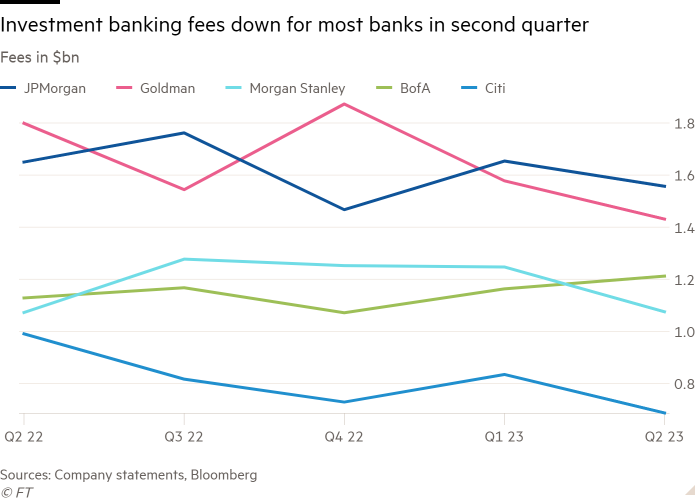Goldman Sachs profits hit by trading slowdown and retail banking retreat

Stay informed with complimentary updates from Goldman Sachs Group
We will deliver a myFT Daily Digest email summarizing the most recent updates on Goldman Sachs Group every morning.

Goldman Sachs experienced a significant decline in its quarterly earnings, hitting its lowest level in a span of three years. This decline can be primarily attributed to the expenses incurred from the withdrawal from consumer banking, exacerbating the negative effects of the overall industry's sluggishness in both deals and trading activities.
The decrease in profits adds additional stress to CEO David Solomon, who is working hard to guide the bank through its most difficult phase since assuming control in 2018.
Goldman Sachs reported that their net earnings for the second quarter declined by nearly 66%, dropping to $1.1 billion from the previous year's $2.8 billion. This aligns with the predictions made by industry analysts.
The prominent financial institution, known as the Wall Street bank, has faced considerable challenges due to the persistent decline in the areas of investment banking and trading, which serve as its primary sources of profit. The revenues generated from investment banking have witnessed a significant drop of 20 percent, amounting to $1.4 billion. Similarly, revenues derived from trading various financial instruments like equities, fixed income, currencies, and commodities have experienced a decline of 12 percent, totaling $5.7 billion.
The previous challenging quarter was further aggravated by numerous expenses, which included a loss of $504 million on GreenSky, an internet-based lender obtained in 2021 during Solomon's unsuccessful attempt to enter the consumer banking field. Additionally, Goldman experienced a decrease in value by $485 million on its investments in real estate.

Chris Kotowski, a research analyst at Oppenheimer, characterized the outcomes as a quarter where various unexpected expenses were included, totaling around $1 billion. These charges could potentially assist in setting a clean slate for Solomon in the future.
Solomon made a significant shift last year, moving away from the group's highly praised venture into consumer banking. Instead, he decided to focus on strengthening Goldman's investment banking and trading sectors. Sadly, this decision coincided with the most challenging circumstances these areas had experienced in a long time.
On Wednesday, Solomon expressed his unwavering belief that if we continue to carry out our plans effectively, we will achieve our long-term return goals and generate substantial benefits for our shareholders.
The decrease in revenues for investment banking was in line with what analysts predicted but was more drastic than the 5.6 percent decline seen at JPMorgan Chase. In contrast, there was no change in investment banking revenues at the closely competing Morgan Stanley and there was a 7 percent increase at Bank of America. However, there was a significant drop of 30 percent in investment banking revenues at Citigroup.
Trading earnings are still higher than before the pandemic, however, the industry is experiencing a decline after the surge caused by the unpredictable financial markets, the increase in interest rates by central banks, and the conflict between Russia and Ukraine.

In Goldman Sachs' trading sector, earnings from stocks increased by 1 percent, reaching nearly $3 billion, exceeding predictions of $2.4 billion. This contributed to the overall revenue for the quarter, which amounted to $10.9 billion, marking an 8 percent decrease compared to the previous year but surpassing expectations.
The fixed-income and commodities traders at Goldman Sachs did not perform as well, experiencing a decline of 26% in revenues to $2.7 billion. This result fell short of the $2.8 billion that analysts had predicted.
Goldman's division for managing assets and wealth, which plays a crucial role in Solomon's attempts to broaden Goldman's range of business activities, recorded $3 billion in revenue. This number represents a 4 percent decrease compared to the same timeframe in the previous year, falling short of analysts' estimated revenue of $3.5 billion. The earnings were negatively affected by the depreciation of real estate investments.
Goldman's profitability, as measured by its return on equity, was a mere 4 percent during the quarter. This figure is significantly lower than its peers and falls far short of the bank's desired target range of 14 to 16 percent.
The bank's stocks, which have experienced a decline of approximately 2 percent in the current year, commenced trading with a slight decrease in New York. Experts had surprisingly differing opinions regarding the severity of the bank's performance in the quarter.
Further information provided by Stephen Gandel
This blog post has been modified to provide additional clarification that Goldman Sachs' profits for the second quarter of this year are the lowest they have been since 2020.













































